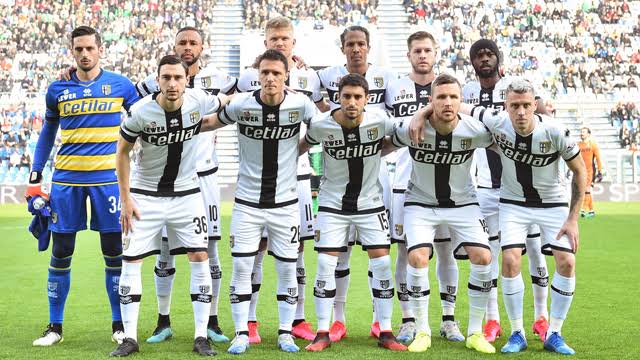Liverpool’s Strategic Interest in Giovanni Leoni: A Comprehensive Analysis of the Young Italian Defender’s Potential Move to Anfield

In the rapidly evolving landscape of modern football, where young talent commands astronomical fees and established stars often come with prohibitive price tags, Liverpool Football Club finds itself navigating a complex transfer market with characteristic precision and strategic foresight. The Merseyside giants, fresh from their Premier League triumph under the astute guidance of Arne Slot, are reportedly turning their attention to one of Italy’s most promising defensive prospects: Giovanni Leoni of Parma Calcio 1913.
The 18-year-old centre-back has emerged as a genuine target for Liverpool’s recruitment team, representing both an immediate investment in defensive solidity and a long-term strategic acquisition that aligns perfectly with the club’s philosophy of developing young talent while competing at the highest level. This potential pursuit of Leoni encapsulates Liverpool’s modern approach to squad building – identifying emerging talent before they reach peak market value while ensuring they possess the attributes necessary to thrive in the Premier League’s demanding environment.
The timing of Liverpool’s interest is particularly significant, coming at a juncture where the club seeks to reinforce their defensive options following their recent success. With Arne Slot having established his tactical framework and philosophical approach during his tenure, the addition of a versatile, physically imposing defender like Leoni could provide the Dutch manager with additional tactical flexibility and depth in crucial areas of the pitch.
Giovanni Leoni represents the archetypal modern centre-back, combining traditional defensive virtues with contemporary technical demands. Standing at an imposing 6’5″, the Italian defender possesses the physical presence that has become increasingly valuable in Premier League football, where aerial duels and physical confrontations remain integral components of defensive success. However, Leoni’s appeal extends far beyond mere physicality, encompassing a sophisticated skill set that suggests significant potential for development at the highest level.
The young defender’s breakthrough campaign in Serie A during the previous season serves as compelling evidence of his readiness for elite-level football. Establishing himself as a first-choice starter in the latter half of the campaign, Leoni accumulated 17 appearances in one of Europe’s most tactically sophisticated leagues. This experience in Serie A, renowned for its defensive complexities and tactical nuances, provides invaluable preparation for the challenges he would face in English football.
Leoni’s technical profile reveals a player who combines traditional defensive strengths with modern requirements for ball-playing ability. His aerial dominance, both defensively and in attacking set-piece situations, provides a significant tactical advantage. Coupled with his ground-based defensive capabilities, this dual threat makes him particularly valuable in contemporary football, where defenders must contribute across multiple phases of play.
Perhaps most impressively, Leoni demonstrates exceptional recovery pace – a crucial attribute in modern high-line defensive systems. This speed allows him to recover from potentially compromising positions, providing insurance for aggressive defensive positioning and enabling his team to maintain compact defensive structures without sacrificing security. Such attributes align perfectly with Liverpool’s tactical requirements under Slot’s system, where defenders must balance aggressive positioning with defensive responsibility.
The tactical maturity Leoni displays, particularly remarkable given his age, suggests a player who possesses an intuitive understanding of defensive positioning and timing. This football intelligence, combined with his physical attributes, creates a compelling profile that explains Liverpool’s reported interest. The ability to read the game effectively at such a young age often indicates significant potential for further development under expert coaching
Leoni’s experience in Serie A cannot be understated when evaluating his potential impact in English football. The Italian league’s reputation for tactical sophistication and defensive excellence provides young players with an education in defensive fundamentals that translates effectively to other European competitions. The tactical demands of Serie A, with its emphasis on positional discipline, reading of the game, and defensive organization, create an ideal developmental environment for promising defenders.
During his breakthrough season, Leoni faced some of Europe’s most technically gifted attackers, providing him with valuable experience against diverse playing styles and tactical approaches. This exposure to high-level competition at such a young age represents accelerated development that many prospects never receive. The mental fortitude required to establish himself as a regular starter in Serie A demonstrates character traits that Liverpool’s recruitment team values highly.
The defensive principles ingrained through Serie A experience often prove advantageous when players transition to other leagues. The tactical discipline and positional awareness developed in Italian football provide a solid foundation upon which other aspects of the game can be built. For Liverpool, this represents an opportunity to acquire a player with established defensive fundamentals who can be further developed to suit their specific tactical requirements.
Moreover, Leoni’s ability to adapt to the physical and tactical demands of Serie A suggests resilience and adaptability – qualities essential for successful transitions to new leagues and environments. His performance consistency throughout his breakthrough season indicates a player capable of handling pressure and maintaining standards across extended periods.
Liverpool’s interest in Leoni must be understood within the broader context of their squad composition and tactical evolution under Arne Slot. The Dutch manager’s approach to defensive organization requires center-backs who can contribute across multiple phases of play, from traditional defensive responsibilities to ball progression and attacking support during set-pieces.
The current Liverpool squad possesses established defensive quality, but the addition of young talent like Leoni represents strategic planning for both immediate contribution and long-term development. The Premier League’s physical demands and fixture congestion require substantial squad depth, particularly in defensive positions where injury or suspension can significantly impact team performance.
Slot’s tactical system places specific demands on center-backs, requiring them to be comfortable in possession, capable of accurate distribution, and able to defend effectively in various scenarios. Leoni’s profile suggests compatibility with these requirements, particularly his combination of physical presence and technical ability. The young Italian’s pace provides additional tactical flexibility, allowing Liverpool to implement higher defensive lines without sacrificing security.
The potential acquisition of Leoni could also provide Liverpool with tactical versatility, enabling different defensive configurations depending on opposition and game situations. His physical attributes make him particularly effective against certain types of attacking threats, while his technical skills ensure he can contribute to Liverpool’s possession-based approach when appropriate.
Furthermore, Liverpool’s recent success has attracted increased scrutiny from opponents, requiring tactical adaptation and deeper squad resources. The addition of quality young players like Leoni represents preparation for sustained success across multiple competitions and seasons
The reported valuation of Giovanni Leoni at approximately €40 million (£34.5 million) reflects current market dynamics for promising young defenders. While this represents a significant investment, it falls within Liverpool’s financial capabilities and aligns with their strategic approach to squad development. The fee structure typical of such deals often includes performance-related bonuses, providing value protection while incentivizing development.
Liverpool’s financial position, strengthened by recent success and strategic commercial partnerships, enables them to compete for high-quality young talent without compromising their broader strategic objectives. The investment in Leoni represents both immediate squad enhancement and potential future value appreciation, as successful development could significantly increase his market worth.
The competitive landscape for Leoni’s signature includes several prominent clubs, including Inter Milan, Tottenham, and Newcastle United. However, Liverpool’s recent success, established development pathway for young players, and Champions League participation provide competitive advantages in attracting emerging talent. The club’s reputation for developing young defenders, evidenced by players like Jarell Quansah, offers appealing prospects for ambitious young players.
Market timing plays a crucial role in such acquisitions. Securing Leoni’s services before further breakthrough performances could represent shrewd business, as successful young players often see dramatic valuation increases following sustained elite-level performance. Liverpool’s proactive approach to identifying and pursuing such talent reflects sophisticated recruitment strategy.
The financial dynamics of the transfer also benefit from Leoni’s age and contract situation. Young players often command lower wage demands than established stars, allowing clubs to invest in potential while maintaining reasonable financial commitments. This approach enables Liverpool to build squad depth without compromising their wage structure
While Giovanni Leoni remains uncapped at senior international level, his progression through Italy’s youth systems indicates recognition of his potential by national team coaches. His most recent appearance for Italy’s U19 team, contributing to a 2-0 victory over France, demonstrates his ability to perform in high-pressure international fixtures.
The pathway from youth international football to senior recognition often correlates with club success and development. Liverpool’s platform for showcasing young talent in high-profile competitions could accelerate Leoni’s international progression, providing mutual benefits for player and club. Success with Italy’s senior national team would further enhance his profile and market value.
Italy’s current defensive depth provides both opportunity and challenge for emerging players like Leoni. The national team’s traditional strength in defensive positions creates competitive selection environments, but also ensures that breakthrough players receive excellent coaching and development support. Leoni’s continued involvement with national youth teams suggests confidence in his potential from Italian coaching staff.
The international dimension of Leoni’s career also provides Liverpool with additional marketing and commercial opportunities. Italian players often generate significant interest in one of football’s most passionate markets, potentially enhancing the club’s global appeal and commercial partnerships.
Moreover, international experience provides players with exposure to diverse tactical approaches and playing styles, contributing to their overall development. Leoni’s continued progression through international age groups would complement his club development, creating synergistic effects for his overall growth as a player.
Arne Slot’s tactical philosophy at Liverpool emphasizes possession-based football with aggressive pressing and quick transitions between defensive and attacking phases. Center-backs in this system must possess diverse skill sets, combining traditional defensive responsibilities with modern demands for ball progression and tactical flexibility.
Leoni’s physical attributes provide natural advantages in Slot’s system, particularly his aerial ability and recovery pace. The Dutch manager’s preference for high defensive lines requires center-backs who can defend space effectively while maintaining positional discipline. Leoni’s pace provides insurance for such tactical approaches, enabling aggressive positioning without compromising defensive security.
The young Italian’s technical abilities suggest compatibility with Liverpool’s possession-based approach. Center-backs in modern football must contribute to build-up play, requiring comfort in possession and accuracy in distribution. Leoni’s Serie A experience indicates familiarity with such demands, as Italian football emphasizes technical precision and tactical discipline.
Slot’s system also requires defensive flexibility, with center-backs capable of adapting to different formations and tactical scenarios during matches. Leoni’s versatility and football intelligence suggest aptitude for such tactical complexity, providing Liverpool with additional strategic options across various competition scenarios.
The integration process for young players like Leoni benefits from Liverpool’s established development infrastructure. The club’s coaching staff possesses extensive experience in adapting young talent to Premier League demands while maintaining their core strengths and characteristics.
Liverpool’s potential pursuioth Giovanni Leoni and Crystal Palace captain Marc Guehi reflects a comprehensive approach to defensive reinforcement. The acquisition of both players would provide Slot with substantial tactical flexibility while ensuring adequate depth for sustained success across multiple competitions.
The competitive dynamic between existing squad members and new signings often drives improved performance levels throughout the team. Leoni’s arrival could stimulate enhanced performances from current defenders while providing valuable competition for starting positions. Such healthy internal competition typically benefits overall squad performance and development.
Leoni’s profile as a long-term developmental prospect complements Liverpool’s existing defensive personnel. While established players provide immediate experience and leadership, young talents like Leoni offer potential for extended future contribution. This balanced approach ensures both short-term competitiveness and long-term sustainability.
The integration of young international talent also enhances squad diversity, bringing different perspectives and experiences to training environments. Leoni’s Serie A background could provide tactical insights and alternative approaches that benefit overall team development.
Moreover, the investment in young defensive talent demonstrates Liverpool’s commitment to sustained success, signaling ambition to both current squad members and potential future signings. Such strategic planning reinforces the club’s position as an attractive destination for ambitious players seeking development and success.
The current transfer window timeline, with closure scheduled for September 1st, provides Liverpool with adequate time to complete negotiations for Giovanni Leoni while addressing other squad requirements. However, the complexity of international transfers, particularly involving young players, requires careful planning and execution.
The reported lack of direct contact between Liverpool and Parma suggests negotiations remain in preliminary stages, with initial focus on gauging player interest and establishing basic parameters. This approach allows Liverpool to assess feasibility before committing significant resources to formal negotiations.
The primary challenge appears to be convincing Leoni to leave Italy, reflecting natural reluctance for young players to abandon familiar environments during crucial developmental phases. Liverpool’s recruitment team must demonstrate clear development pathways and opportunities for growth that outweigh the comfort of remaining in familiar surroundings.
Successful completion of such transfers often depends on comprehensive packages addressing player concerns about adaptation, development, and future opportunities. Liverpool’s reputation for supporting young player development provides advantages in such discussions, as evidenced by previous successful integrations of international talent.
The logistical aspects of international transfers, including work permits, medical examinations, and contract negotiations, require careful coordination within compressed timeframes. Liverpool’s experienced transfer team possesses the expertise necessary to navigate such complexities efficiently.
Liverpool’s reported interest in Giovanni Leoni represents more than a simple squad addition; it embodies the club’s strategic vision for sustained success through intelligent talent acquisition and development. The pursuit of the young Italian defender demonstrates sophisticated understanding of market dynamics, tactical requirements, and long-term planning considerations.
The potential acquisition of Leoni, whether alone or alongside other defensive targets, would provide Liverpool with enhanced tactical flexibility and squad depth necessary for competing across multiple competitions. His combination of physical attributes, technical ability, and developmental potential aligns perfectly with the club’s recruitment philosophy and tactical requirements.
The financial investment required for Leoni’s signature represents manageable commitment for Liverpool while potentially providing significant future value through successful development and performance. The club’s established track record with young player development suggests favorable conditions for maximizing his potential contribution.
M
Moreover, the pursuit of Leoni reinforces Liverpool’s position as an attractive destination for emerging international talent, potentially facilitating future recruitment efforts. The demonstration of faith in young players often resonates throughout the football community, enhancing the club’s reputation among players, agents, and other stakeholders.
The broader implications of successful acquisition extend beyond immediate squad enhancement, contributing to Liverpool’s long-term strategic positioning in an increasingly competitive global football landscape. The investment in young, high-potential talent provides foundation for sustained success while maintaining financial sustainability.
Ultimately, whether Giovanni Leoni joins Liverpool or remains in Italy, the club’s interest demonstrates their continued commitment to identifying and pursuing the highest quality talent available. This proactive approach to squad development, combined with established success in player development, positions Liverpool favorably for continued achievement across domestic and international competitions.
The coming weeks will determine whether Liverpool can convince the young Italian to embrace a new challenge at Anfield, but their interest alone demonstrates the sophisticated recruitment strategy that has contributed significantly to their recent success. Regardless of outcome, the pursuit of Giovanni Leoni exemplifies Liverpool’s unwavering commitment to excellence and strategic planning for sustained future achievement.















